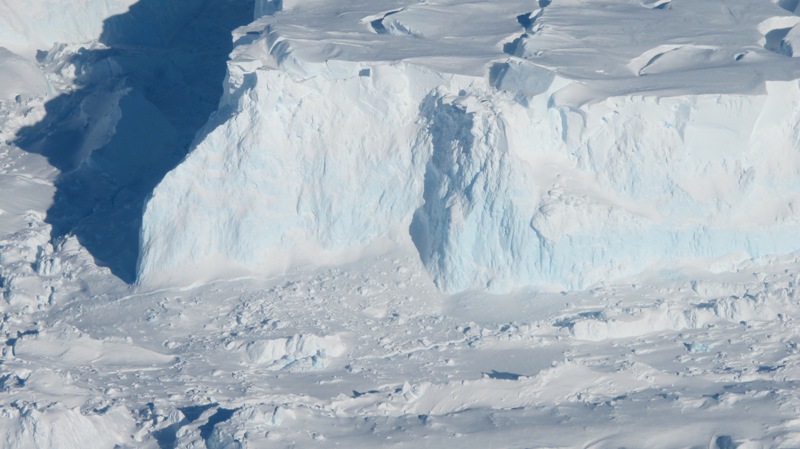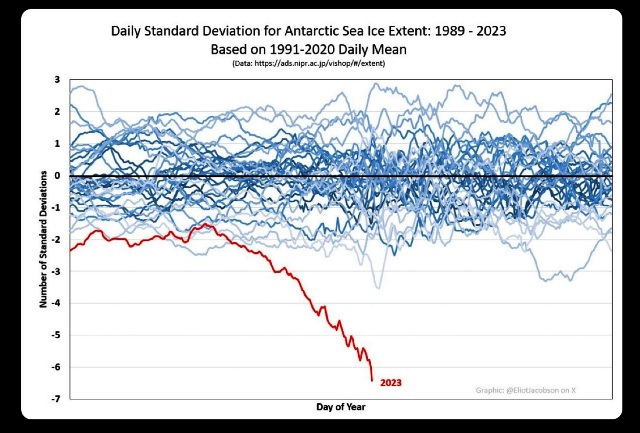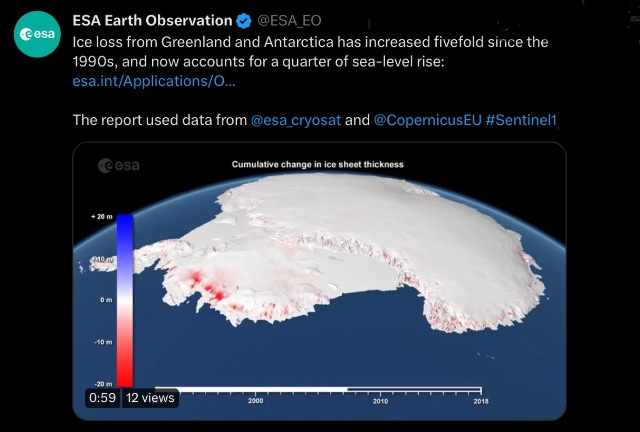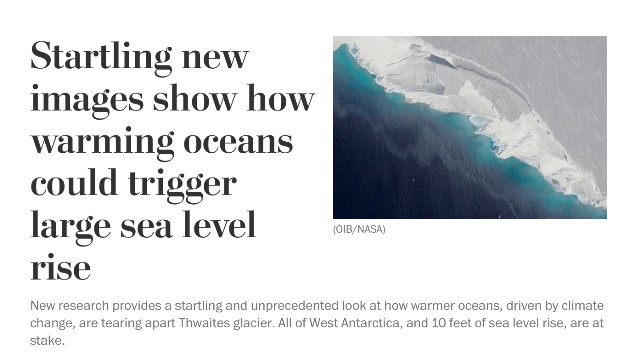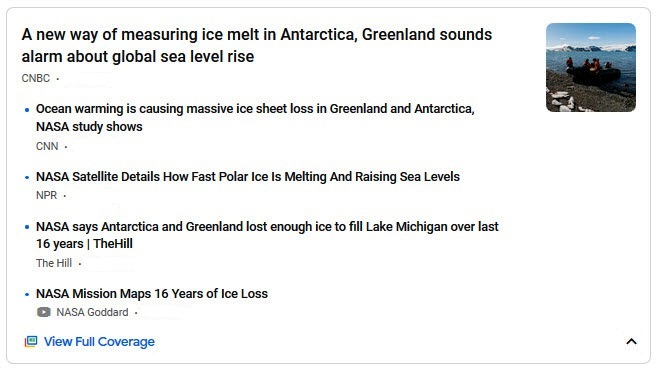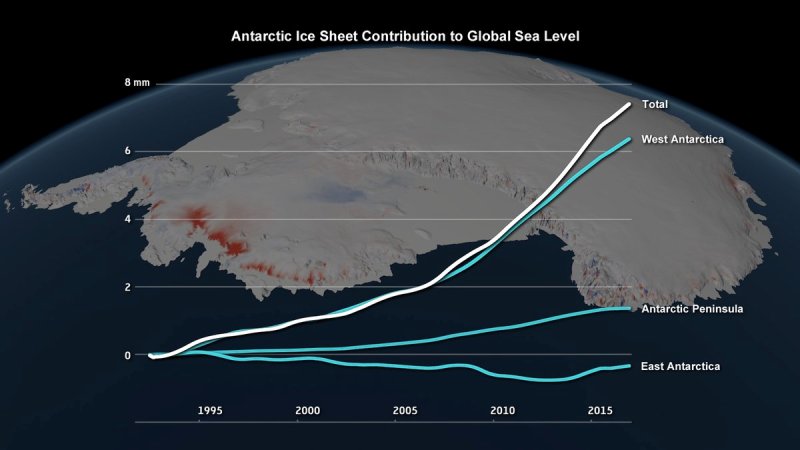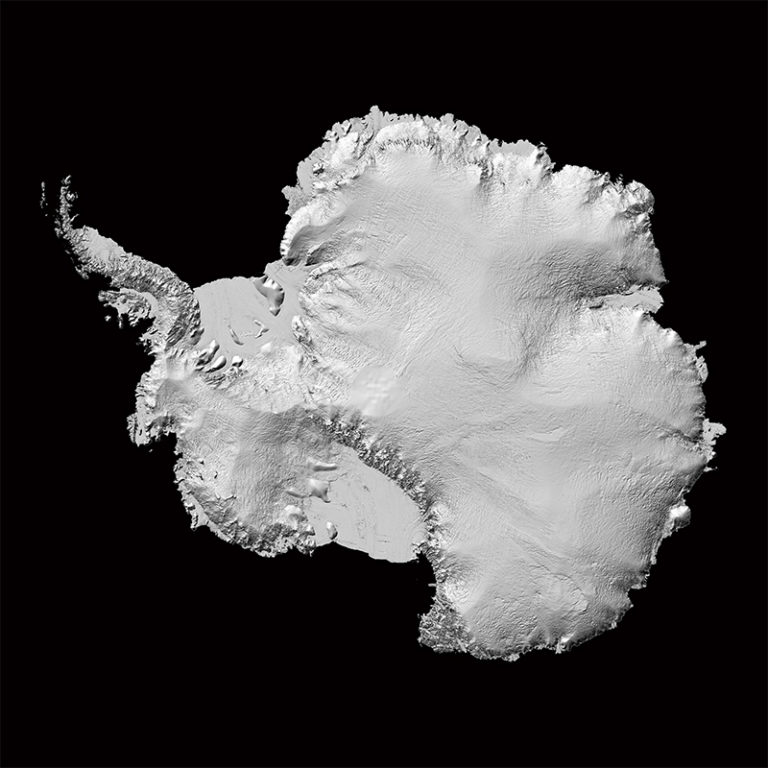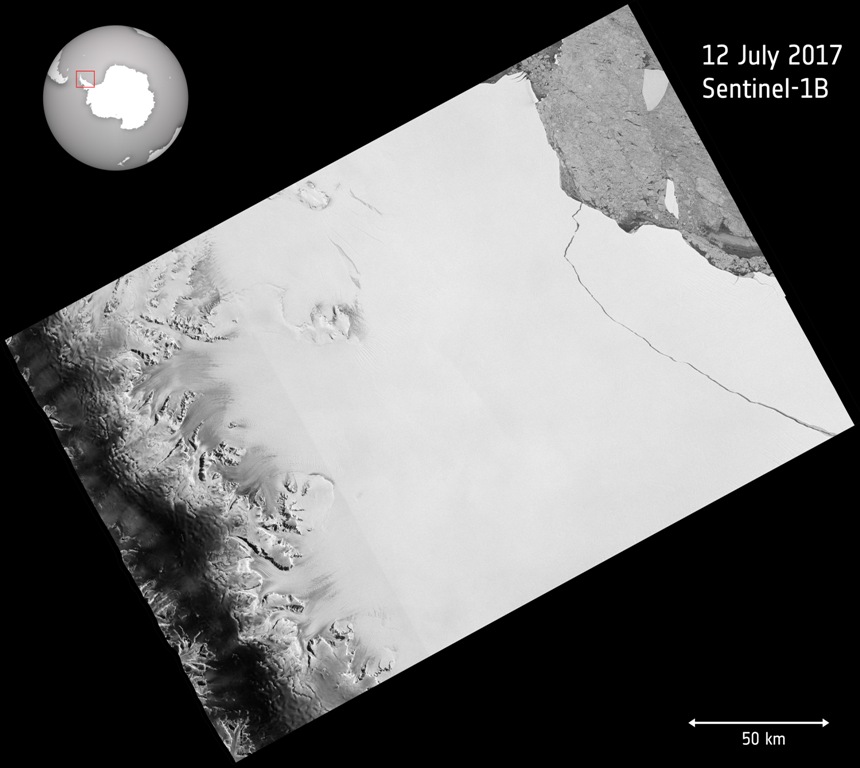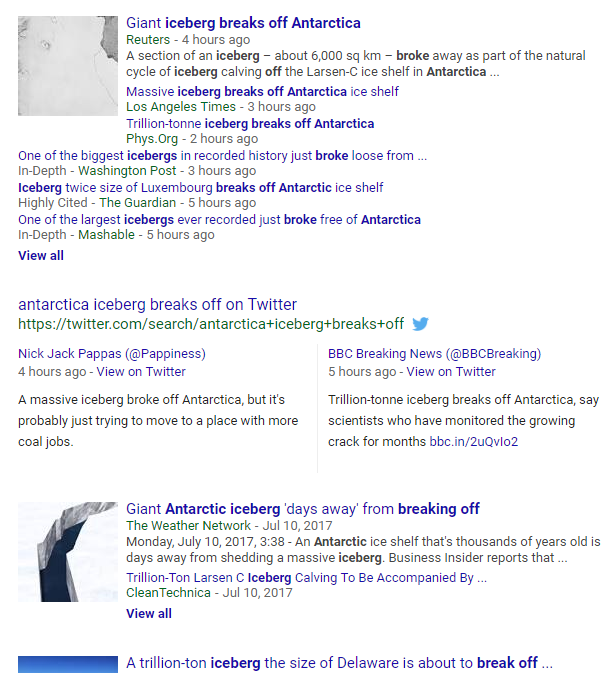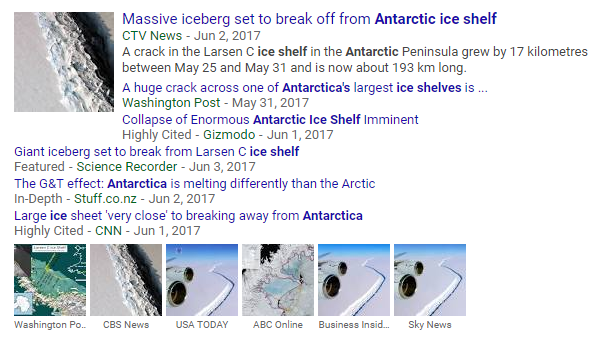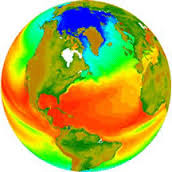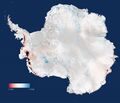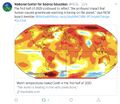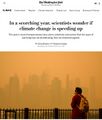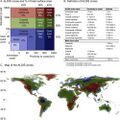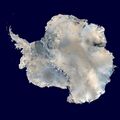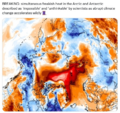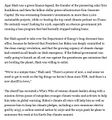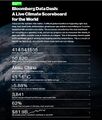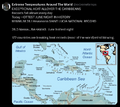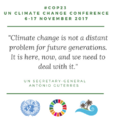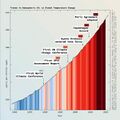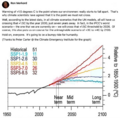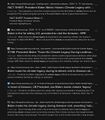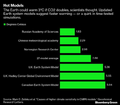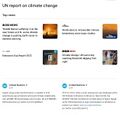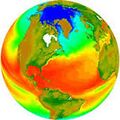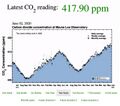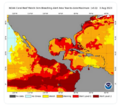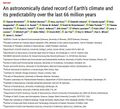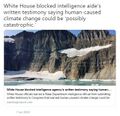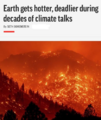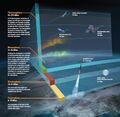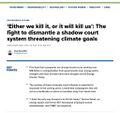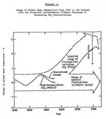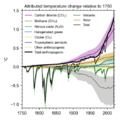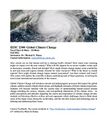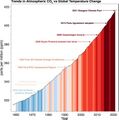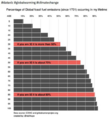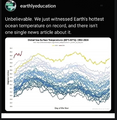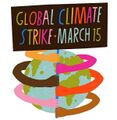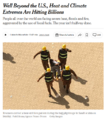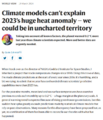Category:Antarctica: Difference between revisions
Siterunner (talk | contribs) No edit summary |
Siterunner (talk | contribs) No edit summary |
||
| (8 intermediate revisions by the same user not shown) | |||
| Line 1: | Line 1: | ||
[[File:Featured.png]] | [[File:Featured.png]] | ||
| Line 10: | Line 10: | ||
<big><big>'''''2023'''''</big></big> | <big><big>'''''2023'''''</big></big> | ||
October 2023 | |||
<big>Where’s All the Antarctic Sea Ice? Annual Peak Is the Lowest Ever Recorded</big> | |||
National Snow and Ice Data Center reports record lows for each month since April. | |||
''“Things got really strange,” said Walt Meier, a senior research scientist at the National Snow and Ice Data Center. “It started diverging from anything we’d seen before.”'' | |||
[[File:Antarctic sea ice 1989-2023 chart as of July2023.png]] | |||
<small>* https://en.wikipedia.org/wiki/Antarctic_sea_ice</small> | |||
July 2023 | ''Antarctica's sea ice has melted so fast — and the Earth has remained so much warmer than usual — that scientists are sounding a global alarm. The reason is simple: Antarctic sea ice that always comes back after first melting has not returned. Vast regions of Antarctic coast are exposed that were never bare before.'' | |||
''As physical oceanographer Edward Doddridge put it, referring to this development as "unprecedented" simply "isn't strong enough. For those of you who are interested in statistics, this is a five-sigma event. So it's five standard deviations beyond the mean."'' | |||
''In other words: "If nothing had changed, we'd expect to see a winter like this about once every 7.5 million years."'' | |||
* https://www.salon.com/2023/07/25/antarcticas-rapidly-melting-ice-is-in-unprecedented-territory/ | |||
·························································································· | |||
| Line 28: | Line 55: | ||
"A CLOSER VISIT WITH DR. JEFFREY SEVERINGHAUS: HOW DANGEROUS IS THE NEW ANTARCTIC ICE MELT FOR CLIMATE CHANGE?" | "A CLOSER VISIT WITH DR. JEFFREY SEVERINGHAUS: HOW DANGEROUS IS THE NEW ANTARCTIC ICE MELT FOR CLIMATE CHANGE?" | ||
"The regular supply of very cold water has been cut off..." | :"The regular supply of very cold water has been cut off..." | ||
* https://hotglobe.substack.com/p/a-closer-visit-with-dr-jeffrey-severinghaus | :* https://hotglobe.substack.com/p/a-closer-visit-with-dr-jeffrey-severinghaus | ||
Latest revision as of 12:07, 9 October 2023
Thwaites Glacier, Antarctica
2023
October 2023
Where’s All the Antarctic Sea Ice? Annual Peak Is the Lowest Ever Recorded
National Snow and Ice Data Center reports record lows for each month since April.
“Things got really strange,” said Walt Meier, a senior research scientist at the National Snow and Ice Data Center. “It started diverging from anything we’d seen before.”
* https://en.wikipedia.org/wiki/Antarctic_sea_ice
July 2023 | Antarctica's sea ice has melted so fast — and the Earth has remained so much warmer than usual — that scientists are sounding a global alarm. The reason is simple: Antarctic sea ice that always comes back after first melting has not returned. Vast regions of Antarctic coast are exposed that were never bare before.
As physical oceanographer Edward Doddridge put it, referring to this development as "unprecedented" simply "isn't strong enough. For those of you who are interested in statistics, this is a five-sigma event. So it's five standard deviations beyond the mean."
In other words: "If nothing had changed, we'd expect to see a winter like this about once every 7.5 million years."
··························································································
The Ice Core Story & Disruptions of the Current Era
Measuring Gasses & Looking at Outgassing of CO2, Methane, & 'Business-as-Usual
Warming, Ice Melt, Interupted Water Flow & Nutrients, Ocean Life ... Connections & the Trendlines
Note the 'Rare gases', also known as the noble gases or the inert gases, a group of six gaseous elements found in small amounts in the atmosphere (and being investigated in current times as they were trapped historically in the Antarctic and are now being retrieved in deep-drilled ice cores): helium (He), neon (Ne), argon (Ar), krypton (Kr), xenon (Xe), and radon (Rn)
(Visit the recent Nature journal science study reported here below at GreenPolicy360)
Full Audio Interview
"A CLOSER VISIT WITH DR. JEFFREY SEVERINGHAUS: HOW DANGEROUS IS THE NEW ANTARCTIC ICE MELT FOR CLIMATE CHANGE?"
- "The regular supply of very cold water has been cut off..."
······································································································
Ice loss from Greenland and Antarctica hits new record
Ice loss from Greenland and Antarctica has increased fivefold since the 1990s, and now accounts for a quarter of sea-level rise.
It is without doubt that climate change is causing our polar ice sheets to melt, thereby driving up sea levels and putting coastal regions around the world at risk.
Since 1992, when satellite records of ice-sheet melt began, the polar ice sheets have lost ice every single year. The highest rates of melt have occurred in the past decade.
Scientists use data from satellites such as ESA’s CryoSat and the European Union’s Copernicus Sentinel-1 to measure changes in ice volume and flow, as well as satellites that provide information on gravity, to work out how much ice is being lost.
A team of scientists compile these records in the Ice Sheet Mass Balance Intercomparison Exercise (IMBIE), which is funded by ESA and NASA. This is used widely, including by the International Panel on Climate Change (IPCC), to understand and respond to the climate crisis.
The latest IMBIE assessment, which was published today, states that between 1992 and 2020, the polar ice sheets lost 7560 billion tonnes of ice – equivalent to an ice cube measuring 20 km each side...
🌎
Major Study of Ice-melt Impacts Reported in the Nature Journal:
Melting Antarctic ice predicted to cause rapid slowdown of deep ocean current by 2050
New research by Australian scientists suggests 40% slowdown in just three decades could alter world’s climate for centuries
Abyssal ocean overturning slowdown and warming driven by Antarctic meltwater
Li, Q., England, M.H., Hogg, A.M. et al. Abyssal ocean overturning slowdown and warming driven by Antarctic meltwater. Nature 615, 841–847 (2023). https://doi.org/10.1038/s41586-023-05762-w
Received 20 March 2022; Accepted 25 January 2023; Published 29 March 2023
Nature Issue Date: 30 March 2023
DOI: https://doi.org/10.1038/s41586-023-05762-w | (DOI/Digital Object Identifier)
Abstract
The abyssal ocean circulation is a key component of the global meridional overturning circulation, cycling heat, carbon, oxygen and nutrients throughout the world ocean. The strongest historical trend observed in the abyssal ocean is warming at high southern latitudes, yet it is unclear what processes have driven this warming, and whether this warming is linked to a slowdown in the ocean’s overturning circulation. Furthermore, attributing change to specific drivers is difficult owing to limited measurements, and because coupled climate models exhibit biases in the region. In addition, future change remains uncertain, with the latest coordinated climate model projections not accounting for dynamic ice-sheet melt. Here we use a transient forced high-resolution coupled ocean–sea-ice model to show that under a high-emissions scenario, abyssal warming is set to accelerate over the next 30 years. We find that meltwater input around Antarctica drives a contraction of Antarctic Bottom Water (AABW), opening a pathway that allows warm Circumpolar Deep Water greater access to the continental shelf. The reduction in AABW formation results in warming and ageing of the abyssal ocean, consistent with recent measurements. In contrast, projected wind and thermal forcing has little impact on the properties, age and volume of AABW. These results highlight the critical importance of Antarctic meltwater in setting the abyssal ocean overturning, with implications for global ocean biogeochemistry and climate that could last for centuries.
If greenhouse gas emissions continue at today’s levels, the current in the deepest parts of the ocean could slow down by 40% in only three decades.
This, the scientists said, could generate a cascade of impacts that could push up sea levels, alter weather patterns and starve marine life of a vital source of nutrients.
Antarctic ice melt could disrupt the world’s oceans
The Antarctic overturning circulation is part of a global network of currents that shift heat, oxygen and nutrients around the globe
What happens in Antarctica doesn't stay in the Antarctic
Global warming is accelerating the melting of ice in Antarctica, and the increased amount of fresh water flooding into the ocean is disrupting the flow of the Antarctic overturning circulation, according to a study published in the journal Nature.
- https://www.straitstimes.com/world/antarctic-ice-melt-could-disrupt-the-world-s-oceans-study
- https://www.straitstimes.com/world/europe/monster-iceberg-released-billions-of-tonnes-of-fresh-water-into-ocean
“Changes that happen in one location, such as Antarctica, can then have a global influence because those waters move all throughout the planet,” said study co-author Adele Morrison, a research fellow from the Research School of Earth Sciences at the Australian National University in Canberra.
But there are signs the overturning circulation is slowing, disrupted by the increasing amount of meltwater from Antarctica that is making the waters less salty, and therefore less dense and not sinking with the same force.
And the melting is increasing as growing amounts of greenhouse gas emissions, mainly from burning fossil fuels, are heating up the atmosphere and oceans.
“Our modelling shows that if global carbon emissions continue at the current rate, then the Antarctic overturning will slow by more than 40 per cent in the next 30 years – and on a trajectory that looks headed towards collapse,” said co-author Matthew England, deputy director of the ARC Centre for Excellence in Antarctic Science at the University of New South Wales in Sydney.
Bill McKibben, former GreenPolicy360 adviser explains:
Basically, as melting ice pours fresh water into the ocean around Antarctica, it dilutes the salinity of the sea; that reduces its density and it’s no longer heavy enough to sink, pushing out the water that’s already there. The decomposing organisms that have dropped to the sea floor thus remain locked there, as the whole vast conveyor belt begins to slow. This phenomenon has already been observed in the Arctic, where melting water pouring off Greenland and from melting sea ice has slowed the Arctic Meridional Overturning Current, or AMOC; the Australian scientists behind this new study have confirmed that the same thing is underway in the antipodes. The water that once flowed north, carrying nutrients to the Pacific, Atlantic and Indian oceans will stagnate in place."
"Other studies have predicted additional problems as these currents decline, including moving rainfall bands by a thousand kilometers from their present position. As one scientist put it, the Antarctic current is “on a trajectory that looks headed towards collapse,” and not on a scale of centuries, or even century. On a scale of decades and years. We’re as far from 2050 as we are from Bill Clinton denying he’d had “sexual relations” with “that woman,” which is to say not very far (and also reminder that embarrassing presidents are not in themselves a new phenomenon, even if Trump took it to an entirely new and endlessly more dangerous level).
The scale of the systems we’re now affecting is almost incomprehensible—the flow of the Arctic current is a hundred times larger than the Amazon river. And the speed is incomprehensible. “In the past, these circulations have taken more than 1,000 years or so to change, but this is happening over just a few decades,” one of the study’s author’s said. “It’s way faster than we thought these circulations could slow down.”
But that’s because we’ve built a new planet, one with a markedly different atmosphere. Which changes everything. Even before the epochal news from the Antarctic, the earth’s oceans had been sending distressing signals this spring. In late March, scientists reported that the temperature of ocean waters around the planet was rising abruptly, reaching record levels in recent weeks.
- 'Doomsday Glacier' Shows Its Underside (It's Breached with Terraces)
- https://www.washingtonpost.com/climate-environment/2023/02/15/glacier-ice-melt-ocean-warming/
- https://www.cnn.com/2023/02/15/world/thwaites-doomsday-glacier-sea-level-climate-intl/index.html
- https://www.nature.com/articles/s41586-022-05586-0
Antarctic Sea Ice Cover at Record Low
There is currently less sea ice in the Antarctic than at any time in the forty years since the beginning of satellite observation: in early February 2023, only 2.20 million square kilometres of the Southern Ocean were covered with sea ice. Researchers from the Alfred Wegener Institute and the University of Bremen analyse the situation for the Sea Ice Portal. January 2023 had already set a new record for its monthly mean extent (3.22 million square kilometres), even though the melting phase in the Southern Hemisphere continues until the end of February. The current expedition team on board RV Polarstern has just reported virtually ice-free conditions in its current research area, the Bellingshausen Sea.
2022
Antarctica Is in Trouble
It’s 70 degrees warmer than normal in eastern Antarctica
‘This event is completely unprecedented and upended our expectations about the Antarctic climate system.’
The coldest location on the planet has experienced an episode of warm weather this week unlike any ever observed, with temperatures over the eastern Antarctic ice sheet soaring 50 to 90 degrees above normal. The warmth has smashed records and shocked scientists.
2021
Doomsday Glacier in Antarctica
"If there is going to be a climate catastrophe, it’s probably going to start at Thwaites.”
Changes in Land Ice - Antarctica - Greenland (2002-2020) - GIF
Biggest icebergs calve, drift, and crack up
World's ice melting faster than ever
2020
Warming at more than three times the global average over the past 30 years
Study via the journal Nature Climate Change
It's all connected
The scientists said the main cause of the warming was increasing sea surface temperatures thousands of miles away in the tropics. Over the past 30 years, warming in the western tropical Pacific Ocean -- a region near the equator north of Australia and Papua New Guinea -- meant there was an increase in warm air being carried to the South Pole.
"It is wild. It is the most remote place on the planet. The significance is how extreme temperatures swing and shift over the Antarctic interior, and the mechanisms that drive them are linked 10,000 kilometers (6,200 miles) north of the continent on the tropical Pacific."
··································
The Deepest Dive in Antarctica
- http://www.oceanx.org
- http://www.instagram.com/oceanx
- http://www.facebook.com/oceanxorg
- http://www.twitter.com/oceanx
··································
Algae in Antarctica
This summer’s Antarctic weather, as elsewhere in the world, was unprecedented in the observed record
Thwaites, Ominous and Changing as Scientists Watch
2019
What Happens in Antarctica Doesn't Stay in Antarctica
• Via National Geographic / Watching Thwaites Glacier Up Close and Personal by Elizabeth Rush
The Thwaites Glacier is often considered one of the most important when it comes to changes in sea level....
- More re: Thwaites
-- https://www.nytimes.com/2020/01/29/climate/thwaites-glacier-melting-antarctica.html
Along with Thwaites the overwhelming majority of the world’s glaciers have begun to withdraw...
Never forget: The ice is telling you what to do and not you are telling the ice what to do. Thwaites speaks, its calving a message we must now labor to hear.
Elizabeth Rush is the author of Rising: Dispatches from the New American Shore.
Scientists Detect an Enormous Cavity Growing Beneath Antarctica
- http://advances.sciencemag.org/content/5/1/eaau3433
- https://www.news.com.au/technology/environment/climate-change/thwaites-glacier-has-an-enormous-cavity-beneath-it-melted-by-warm-ocean-waters/news-story/d76c01e23593eab1d85324db89c3cd79
- Researchers say the cavity would once have been large enough to hold some 14 billion tonnes of ice. Even more disturbing, the researchers say it lost most of this ice volume over the last three years alone.
- "We have suspected for years that the Thwaites glacier was not tightly attached to the bedrock beneath it," says glaciologist Eric Rignot from the University of California, Irvine, and NASA's Jet Propulsion Laboratory (JPL) in Pasadena, California.
- "Thanks to a new generation of satellites, we can finally see the detail."
- "For global sea-level change in the next century, this Thwaites glacier is almost the entire story."
- Rignot and fellow researchers discovered the cavity using ice-penetrating radar as part of NASA's Operation IceBridge, with additional data supplied by German and French scientists.
- Antarctica is losing ice 6 times faster today than in 1980s
- Antarctic melting study... 'reasons for concern'
Read this research data thread and Antarctic sea-level rise connection from @chriscmooney, environmental reporter from the Washington Post:
- ········································································
Scientists release the most accurate, high-resolution terrain map ever created (2018)
The new Antarctic map shows a resolution of 2 to 8 meters – compared to the previous standard of 1,000 meters.
Reference Elevation Model of Antarctica / Release 1
Accurate Antarctica / Phys.org
Large-format poster map of the Reference Elevation Model of Antarctica (REMA), rendered with a hillshade. Does not include any cartographic elements.
Large-format poster map of the Reference Elevation Model of Antarctica (REMA), rendered with a hillshade. Includes cartographic elements such as place name labels, graticules...
Use the links below to browse the directory for the entire REMA dataset. Refer to Documentation to see the directory structure, naming schemes, and download contents.
HTTP: http://data.pgc.umn.edu/elev/dem/setsm/REMA
FTP: ftp://ftp.data.pgc.umn.edu/elev/dem/setsm/REMA
"Considering that Antarctica is the highest, driest, and one of the most remote places on Earth, we now have an incredible topographic model to measure against in the future," said Paul Morin, a University of Minnesota earth sciences researcher and the director of the Polar Geospatial Center.
"Up until now, we've had a better map of Mars than we've had of Antarctica," said Ian Howat, professor of earth sciences and director of the Byrd Polar and Climate Research Center at The Ohio State University. "Now it is the best-mapped continent on Earth."
"It is the highest-resolution terrain map by far of any continent,’ said Ian Howat, professor of Earth sciences and director of the Byrd Polar and Climate Research Center at The Ohio State University.
- ·······································································
Antarctic Treaty System
NASA IceBridge Antarctica
Antarctica's Flowing Ice
·············································································
2018
Antarctic Melt Needs to be Monitored More Closely
What's Happening in Antarctica Won't Stay in Antarctica
East Antarctic Ice Sheet at Risk
··········
2017
Icebergs Breaking Off That Are Four Times the Size of Manhattan
How active are newly discovered Antarctic volcanoes?
A new volcanic province: an inventory of subglacial volcanoes in West Antarctica
- ...the biggest cluster of volcanoes in the world.
The study, published in the Geological Society Special Publications series, does not indicate whether the volcanoes are active but the team is trying to find out.
As Dr. Robert Bingham, a glacier expert and one of the paper's authors noted to the Guardian, "The big question is: how active are these volcanoes?"
"That is something we need to determine as quickly as possible," Bingham continued. "Anything that causes the melting of ice—which an eruption certainly would—is likely to speed up the flow of ice into the sea."
Ominously, other experts have warned that a reverse situation could also happen — volcanic activity can be triggered by thinning ice sheets from rising global temperatures.
Trillion Ton Iceberg Breaks Off
To Us It's 'Icebergia' & Away It Goes on the High Seas
As 'Icebergia' Comes Into View
- _______________________________________________________
_______________________________________________
The Future of the US Antarctica Station and Research
Climate News Now
Time to act to make a positive difference
For more news on Global Warming from GreenPolicy360, beginning with scientific data in the 1970s...
With a Special Tip of Our Green Hat to George E. Brown and his key role in launching/overseeing Earth & Atmospheric Science missions from space
~
Subcategories
This category has the following 4 subcategories, out of 4 total.
C
E
S
Pages in category "Antarctica"
The following 31 pages are in this category, out of 31 total.
C
E
G
- Glasgow Climate Summit - Pledges, Promises, Declarations - What's Next Up
- Global Climate Action Summit
- Green Stories of the Day
- Green Stories of the Day - GreenPolicy360 Archive
- GreenPolicy360 Archive Highlights 2013
- GreenPolicy360 Archive Highlights 2014
- GreenPolicy360 Archive Highlights 2015
- GreenPolicy360 Archive Highlights 2016
- GreenPolicy360 Archive Highlights 2017
- GreenPolicy360 Archive Highlights 2018
- GreenPolicy360 Archive Highlights 2019
- GreenPolicy360 Archive Highlights 2020
- GreenPolicy360 Archive Highlights 2023
S
T
Media in category "Antarctica"
The following 200 files are in this category, out of 387 total.
(previous page) (next page)- 2020 record temperatures.png 800 × 502; 358 KB
- 3-15-2016 12-29-07 PM.png 538 × 701; 201 KB
- 5 19 14 andrew antarcticaelevationchanges-640x547.jpg 640 × 547; 59 KB
- 7-20-2020 GreenPolicy360 RT No.2.jpg 591 × 510; 125 KB
- A scorching year, what about the 360 warming data.jpg 600 × 706; 106 KB
- Acceptance on behalf of the United States of America.png 448 × 306; 62 KB
- Act now for a livable future.png 501 × 275; 272 KB
- Ag production and GHG emissions.jpg 680 × 510; 33 KB
- Against the Tide - Cover - by Cornelia Dean.jpg 308 × 475; 57 KB
- Air pollution moves globally.png 620 × 412; 256 KB
- Aldis zone blog.jpg 500 × 498; 67 KB
- Andrew Wheeler confirmed to head EPA.jpg 753 × 600; 85 KB
- Antarctic Ice Shelf June 2017.png 600 × 337; 142 KB
- Antarctic sea ice 1989-2023 chart as of July2023.png 640 × 433; 294 KB
- Antarctica from Blue Marble wiki.jpg 768 × 768; 133 KB
- Antarctica ice losses chart-NASA re study.jpg 800 × 450; 43 KB
- Antarctica ice shelf-glaciers 2012.png 956 × 714; 805 KB
- Antarctica NASA 1024x768.jpg 1,024 × 768; 250 KB
- Antarctica science - warming water, shrinking ice.png 640 × 356; 174 KB
- Antarctica-2016 nasa.jpg 1,600 × 900; 174 KB
- Antarctica-2018.jpg 768 × 1,024; 82 KB
- Arctic - Antarctic - Breaking.png 639 × 600; 903 KB
- Arctic Sea Ice Area graphic thru 2016.png 640 × 355; 382 KB
- Atmosphere Science.jpg 800 × 600; 45 KB
- Atmospheric Experiment of Humanity.jpg 519 × 574; 201 KB
- Banking - finance - climate - Mann-1.jpg 452 × 640; 162 KB
- Banking - finance - climate - Mann-2.jpg 452 × 640; 164 KB
- Battle for Democracy.jpg 640 × 123; 24 KB
- Biden introduces leadership team - Nov 24 2020.jpg 800 × 644; 173 KB
- Biden selects Kerry as special climate envoy.jpg 592 × 505; 87 KB
- Biden's assembled an all-star climate team 4-21-2021.jpg 682 × 732; 309 KB
- Biden-Sanders Unity Task Force on Climate.jpg 701 × 780; 139 KB
- Big Oil Rocked by News May 27 2021.jpg 639 × 600; 84 KB
- Bill Nelson on Global Temp Rise and Climate Change.png 640 × 353; 100 KB
- Bill Nye The Planet's on Fire.jpg 800 × 675; 106 KB
- Bloomberg Carbon Clock 10-26-2021 8-47-05 AM EST.png 800 × 195; 356 KB
- Bloomberg Live Climate Data Dashboard.jpg 640 × 756; 156 KB
- Breakpoint - Reckoning with America's Environmental Crisis.jpg 329 × 500; 49 KB
- Bridenstine talks.png 1,485 × 911; 223 KB
- Burst of climate denial as Trump presidency ends.jpg 632 × 604; 92 KB
- Canary - 1.jpg 448 × 901; 144 KB
- Canary - 2.png 446 × 531; 264 KB
- Car heating and cooling.png 465 × 635; 261 KB
- Carbon Brief - Greenhouse gas levels 2021.png 640 × 436; 292 KB
- Caribbean Sea hot - June night 2024.png 676 × 600; 386 KB
- CFSV2 world temp July 3, 2023.png 600 × 800; 513 KB
- CH4 graph - 1980-2020.JPG 640 × 446; 22 KB
- Changes in carbon dioxide per 1000 years - via Climate Central.jpg 682 × 424; 34 KB
- Citizens Climate Lobby - Save Our Future Act 2021.jpg 518 × 262; 77 KB
- Climate Action 25th conf in Madrid.jpg 680 × 510; 22 KB
- Climate activist - Steven Schmidt - 1978 on.png 600 × 480; 174 KB
- Climate Books - 2020.jpg 800 × 450; 69 KB
- Climate Change Conf Nov 6-17.png 464 × 488; 107 KB
- Climate Change COP27 - Nov 11 2022 US Representatives.jpg 712 × 444; 54 KB
- Climate Change COP27 - Nov 11 Kathy Castor.jpg 712 × 710; 77 KB
- Climate change is not moving at a glacial pace.png 448 × 532; 217 KB
- Climate Change US EPA.jpg 600 × 703; 95 KB
- Climate Conferences 1979-2020.jpg 768 × 768; 121 KB
- Climate Crisis - Emily Atkin Heated No. 1.jpg 537 × 453; 61 KB
- Climate Crisis and the Global Green New Deal.jpg 293 × 418; 33 KB
- Climate debate.jpg 493 × 580; 129 KB
- Climate Desk.jpg 390 × 226; 21 KB
- Climate Emergency Institute - Oct 2022.png 610 × 600; 274 KB
- Climate Emergency Institute -- 2021.jpg 800 × 450; 55 KB
- Climate emergency.jpg 800 × 450; 69 KB
- Climate Headline News around the World - July 2023.jpg 600 × 704; 151 KB
- Climate Legacy of Biden.jpg 600 × 687; 265 KB
- Climate Models.png 639 × 558; 123 KB
- Climate News - Oct 28 2022.jpg 626 × 600; 88 KB
- Climate News - United Nations Report - Feb 2022.png 768 × 878; 539 KB
- Climate News Dec 4 2023 in Dubai.png 800 × 1,037; 649 KB
- Climate Plans Enforcement - Resources - GreenPolicy.png 768 × 897; 686 KB
- Climate Science Special Report - US - November 2017.jpg 800 × 445; 122 KB
- Climate strike - Week 171.png 739 × 600; 834 KB
- Climate Strike Around the World - Sep20,2019.jpg 700 × 830; 119 KB
- Climate Summit - Leonardo DiCaprio.png 600 × 663; 521 KB
- Climate Summit live updates - Nov 2 2021.png 751 × 600; 420 KB
- Climate Summit planned-1.jpg 800 × 301; 53 KB
- Climate Summit planned-2.jpg 800 × 187; 31 KB
- Climate Summit planned-3.jpg 800 × 278; 44 KB
- Climate Summit planned-4.jpg 800 × 241; 41 KB
- Climate usa 60 years on.jpg 800 × 480; 34 KB
- ClimateNews 360.jpg 172 × 172; 9 KB
- ClimateNewsFlorida.jpg 448 × 191; 36 KB
- CO2 at Mauna Loa data - June 02, 2020 - 417.90 ppm.jpg 640 × 566; 66 KB
- CO2 cumulative emissions 1850 - 2021 - countries.jpg 640 × 462; 211 KB
- CO2 Emissions per Capita by Country 1960-2014.png 800 × 451; 424 KB
- CO2 emissions-around-the-world.png 800 × 595; 123 KB
- CO2 global pathways via IPCC AR6 - how will we respond.jpg 800 × 450; 57 KB
- CO2 higher than in the past 5 million yrs.jpg 514 × 285; 62 KB
- COP26 Climate Summit concludes.jpg 600 × 800; 160 KB
- COP26 concludes - 2.png 648 × 467; 177 KB
- COP26 concludes - 3.png 648 × 713; 416 KB
- COP26 concludes.png 648 × 528; 329 KB
- COP26 in GLASGOW - 31 OCT-12 NOV 2021.jpg 800 × 264; 51 KB
- COP27 'opening speech'.png 640 × 460; 160 KB
- COP28 News - Dec 13 2023.png 800 × 898; 410 KB
- Coral bleaching - August 2023.png 488 × 430; 261 KB
- Coral bleaching - NOAA - August 2023.png 488 × 338; 201 KB
- Covering Climate Now.jpg 493 × 498; 67 KB
- Cradle of Civilization - and climate change.jpg 640 × 360; 70 KB
- Cumulative CO2 Emissions by Country Since 1850.png 800 × 445; 445 KB
- Dated record of Earths climate - Science Report Sept 10 2020.jpg 735 × 669; 192 KB
- Defend Our Future 6-1-2020.jpg 585 × 458; 103 KB
- Democratic Climate Plan-Introduced June 2020.jpg 528 × 561; 117 KB
- Democratic National Convention-62 climate speakers.jpg 443 × 407; 57 KB
- Democratic Party pres candidates debate in Miami-June 2019.jpg 800 × 534; 124 KB
- Democratic presidential candidates on the Green New Deal.jpg 800 × 359; 57 KB
- Denying human-caused climate change.jpg 639 × 620; 129 KB
- Earth Day 2021 - Climate Summit News-1.jpg 491 × 270; 127 KB
- Earth Day 50 years on.jpg 480 × 548; 107 KB
- Earth Science from Space-Monitoring Ice Melt.jpg 657 × 373; 60 KB
- Earth Science Research from Space.png 800 × 256; 208 KB
- Earth Summit 1992-s.png 336 × 418; 283 KB
- Earth Summit 1992.jpg 600 × 746; 171 KB
- Earth trapping unprecedented amount of heat - NASA.jpg 468 × 373; 56 KB
- Earth-upper-atmosphere-NASA.jpg 800 × 781; 327 KB
- EarthScience Missions via the EOS - 2022.png 800 × 219; 139 KB
- Economist.com global capital snapshot as of July 2020.jpg 800 × 477; 119 KB
- Elizabeth Rush.jpg 394 × 453; 47 KB
- Elon Musk quote - gas externality price.png 680 × 320; 199 KB
- Emissions graph - gleick tw 2018.jpg 640 × 364; 37 KB
- Energy Charter Treaty.jpg 512 × 480; 74 KB
- Environment and Security.jpg 289 × 34; 16 KB
- Environmental laws in US - Supreme Court votes soon.png 800 × 414; 334 KB
- EPA website a 'ghost page' now.png 667 × 233; 45 KB
- ESA Living Planet Symposium - Announcement.png 637 × 600; 508 KB
- ESA Living Planet Symposium - May 2022.png 700 × 600; 258 KB
- ESA re ice loss - April 2023.png 640 × 432; 213 KB
- ESG Fight - Feb 2023.png 396 × 194; 88 KB
- EU agrees to cut emissions 55 percent by 2030.jpg 800 × 558; 96 KB
- EU unveils new climate change policy - July 14 2021 - 1.jpg 800 × 234; 33 KB
- EU unveils new climate change policy - July 14 2021 - 2.jpg 800 × 552; 86 KB
- EU unveils new climate change policy - July 14 2021 - 3.jpg 800 × 549; 89 KB
- EU unveils new climate change policy - July 14 2021 - 4.jpg 800 × 550; 92 KB
- EU unveils new climate change policy - July 14 2021 - 5.jpg 800 × 548; 88 KB
- EU unveils new climate change policy - July 14 2021 - 6.jpg 800 × 557; 89 KB
- EU unveils new climate change policy - July 14 2021 - 7.jpg 800 × 553; 92 KB
- EU unveils new climate change policy - July 14 2021 - 8.jpg 800 × 589; 91 KB
- Extreme temperature-world-May 2024.jpg 640 × 427; 105 KB
- ExxonMobil CO2 climatic response study - Graphic 1 - 1982.png 537 × 680; 150 KB
- ExxonMobil CO2 climatic response study - Graphic 2 - 1982.png 537 × 605; 112 KB
- Flooding in South Florida.png 640 × 742; 293 KB
- Foley on March29,2017.png 487 × 135; 0 bytes
- From 1968 to 1992 -- and the Journey continues....png 572 × 851; 320 KB
- GCAS original.png 800 × 504; 94 KB
- GCAS-2.jpg 800 × 450; 136 KB
- GHG forcings 1750-2020.png 531 × 531; 94 KB
- GHG ppt concentrations 1975-2020.jpg 640 × 361; 69 KB
- Gistemp 1979-2019.png 750 × 491; 335 KB
- Glasgow-Climate Conference News-Nov 6, 2021.png 600 × 800; 290 KB
- Global Changes in temperature 1850-2020.jpg 480 × 480; 152 KB
- Global Climate Change textbook-Edition2.jpg 604 × 680; 96 KB
- Global climate conferences and GHG increases.jpg 793 × 801; 56 KB
- Global Climate Dashboard - NOAA - Climate.gov.png 630 × 480; 165 KB
- Global climate dashboard-NOAA climate.gov.jpg 521 × 221; 45 KB
- Global climate dashboard-www.climate.gov.jpg 800 × 489; 100 KB
- Global Climate Dashboard.jpg 800 × 529; 101 KB
- Global Climate Strike - RU.jpg 450 × 804; 116 KB
- Global fossil fuel emissions - in a lifetime graphic.png 600 × 657; 233 KB
- Global greenhouse gas emissions - 1980 - 2020.png 640 × 480; 158 KB
- Global Primary Energy Consumption - 1800-2017.jpg 800 × 583; 65 KB
- Global sea surface temperature 1982-2024.png 800 × 823; 566 KB
- Global sea surface temperature graph as of 2024.png 800 × 455; 654 KB
- Global Stocktake, the first GST.jpg 800 × 905; 513 KB
- Global temperature change 1850-2016.gif 512 × 288; 1.38 MB
- Global temperature change 1901-2000.jpg 640 × 508; 47 KB
- Global temperature variations over past 200 years.jpg 640 × 360; 29 KB
- Global warming June 2024.jpg 640 × 174; 46 KB
- GlobalClimateStrike-March15,2019.jpg 600 × 613; 30 KB
- GND next steps.png 567 × 660; 304 KB
- GP360 tagcloud2 m.png 531 × 324; 132 KB
- Green New Deal, work in progress.jpg 800 × 450; 62 KB
- Greenhouse gas levels hit record - Reuters.jpg 600 × 696; 104 KB
- GreenPolicy360 - May- 9-2024.png 800 × 406; 119 KB
- GreenPolicy360 - May-10-2024.png 790 × 694; 320 KB
- Greta - the politics thats needed.jpg 639 × 203; 38 KB
- Greta anger into action.png 800 × 419; 528 KB
- Greta Looks Back.PNG 504 × 437; 368 KB
- Greta Thunberg - Week 203 Climate Strike Banner.png 209 × 127; 51 KB
- Greta Thunberg - Week 203 Climate Strike.png 554 × 601; 488 KB
- Heat hitting billions.png 614 × 690; 509 KB
- Historic climate-clean energy vote in US Congress August 12 2022.jpeg 800 × 775; 384 KB
- Historic photographs - Humble Oil TX - Exxon.png 591 × 596; 548 KB
- Hourglass-sand-2.jpg 450 × 342; 12 KB
- House passes biggest climate investment in U.S. history.png 625 × 480; 114 KB
- Huge heat anomaly in 2023 - by Gavin Schmidt.png 735 × 857; 172 KB
- Hurricanes - Typhoons via NASA data.png 764 × 924; 1,022 KB
- I Am Greta - the Documentary.jpg 387 × 485; 30 KB
- I Am Greta Marching.jpg 800 × 534; 80 KB
- I've done all I can.png 584 × 101; 19 KB
- Iceberg breaks off from Antarctica photo from ESA July 12, 2017.jpg 860 × 768; 116 KB
- Icebergia Time July 12, 2017.png 613 × 673; 135 KB
- Icebergia-2.0.png 800 × 286; 362 KB

